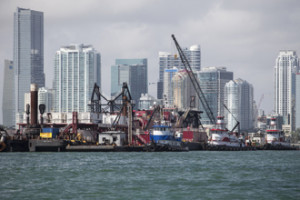
The downtown Miami skyline rises above shipping facilities along the Miami River and Biscayne Bay. Boaters and fishermen also compete for access in this crowded urban setting. UF/IFAS photo by Amy Stuart
By: Tom Nordlie, UF/IFAS News Writer
To call attention to pressing coastal and ocean issues in Florida and the surrounding region, Florida Sea Grant has launched an awareness campaign that includes four special reports to be published in Florida Trend magazine, a monthly publication featuring statewide coverage of business and industry.
The year-long campaign, known as “Florida’s Changing Seas,” is meant to educate residents, visitors, policymakers and professionals in the state’s many maritime industries, said Karl Havens, director of Florida Sea Grant, a statewide program hosted by the University of Florida and affiliated with UF’s Institute of Food and Agricultural Sciences.
“Florida is surrounded by water on three sides, and our state’s economy and lifestyle are inextricably connected to the ocean,” Havens said. “We want to facilitate a dialogue about how ocean resources can be used equitably and responsibly in the years to come, and our reports in Florida Trend highlight some of the most pressing issues.”
The first report addresses coastal access and appears in the March issue of Florida Trend, available now. Upcoming reports will focus on aquaculture (April issue), the economic impact of artificial reefs (June issue) and the safety and sustainability of Florida’s seafood (September.) Additional components of the campaign include news releases, social media posts, photographs and video items.
Coastal access in Florida has increasingly become a matter of public concern as publicly accessible marinas, boatyards and boat ramps are being displaced by high-value construction such as condominiums and hotels. Boaters have been left with fewer options for getting their craft in and out of the water, even as the number of registered boaters has increased, Havens said.
“Recreational boating and saltwater fishing are important and economically significant activities,” Havens said. “The question is, how can we ensure that there are ample launching and docking facilities for people who need them, without unfairly hindering development that also contributes to the state’s economic well-being?”
To help residents, visitors and stakeholders understand coastal access issues, the first Florida Trend report announces the launch of a Sea Grant website, “Accessing the Florida Coast.” This self-help resource provides information about the legal and regulatory framework governing use of Florida’s coastline, which spans 825 miles.
“We hope that the website will help educate people in Florida’s coastal communities address their water-access concerns and also help those who visit the coast, or work in businesses that require coastal access,” Havens said.
The website includes several informative toolkits that address coastal access by beachgoers and boaters, as well as the preservation of working waterfronts used by marinas, seafood businesses and related businesses.
The toolkits contain materials on numerous topics, including development planning, basic legal principles governing coastal access, current state laws, creation of local ordinances and tax policies.
The website also describes current Florida Sea Grant research projects related to coastal access, and provides contact information for agencies and organizations that can provide additional help to users.
Material found at the website was developed by UF/IFAS Extension boating and waterway planning experts with the Florida Sea Grant Program, and faculty and students from the UF Levin College of Law’s Conservation Clinic.
“This website was carefully developed, reviewed and refined to ensure its accuracy, relevance and ease of use,” Havens said. “We’re confident that it will prove to be a valuable asset to state residents and visitors, and we’re delighted to announce it as part of the first installment of our series in Florida Trend.”
The March issue of Florida Trend is available at newsstands and book stores through the end of March.



